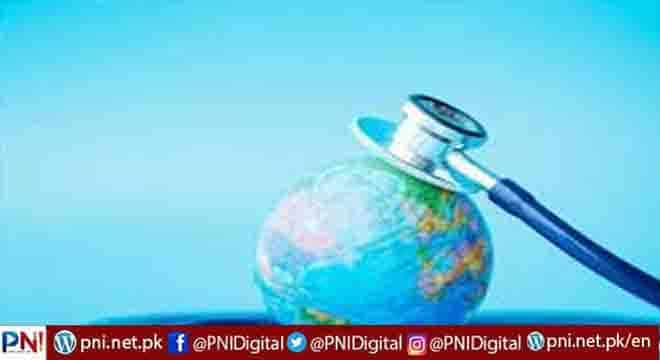ISLAMABAD, July 02 (ONLINE): The consensus among scientists is that we are in an era of global heating and extreme weather events, primarily due to the devastating effects of human action on the environment. Why are researchers concerned and what are the implications for health?
The Lancet Countdown team is a group of over 120 leading experts on climate, public health, economy, and political science — among others — who have committed to monitoring climate change, particularly its impact on global health.
Since 2015, the year of the Paris Agreement, the experts affiliated with the Lancet Countdown commission have published yearly reportsTrusted Source assessing this situation and keeping signatory governments and decision-makers accountable for the commitments they have taken on following the Agreement.
The latest report, which appeared in The LancetTrusted Source in October 2021, records “deepening inequities” across all regions as global heating remains a concern. The report discusses the impact of climate change in the context of the COVID-19 pandemic, and it emphasizes the concern caused by extreme heat events and related natural disasters that have occurred over the past 2 years.
What climate change means for sustainability
According to the Lancet Countdown report 2021, “[t]he world is now 1.2 [degrees Celsius] warmer than in the pre-industrial period (1850–1900),” with the past few years recorded as the hottest yet — 2016 has seen the highest levels of heat around the world.
The IPCC reports 2022 record the current global heat level as even higher, placing it at 1.5 degrees Celsius (34.7 degrees Fahrenheit) hotter compared with the pre-industrial period.
According to data from the National Aeronautics and Space Administration (NASA), most of the global heating has occurred abruptly over the past 40 years as a result of human activity that has led to an increase in greenhouse gas levels.
“[G]reenhouse gases that have been accumulating in the atmosphere due to human activity are gases like carbon dioxide [and] methane. And what these gases do is [that they] basically absorb the heat, and they don’t allow heat that comes from the Sun into the Earth [to] be reflected back into space,” Dr. Romanello explained.
Climate change and physical health
But climate change, particularly extreme heat and extreme weather events, can have a more direct impact on the human body, sometimes in surprising ways.
A recent study from the Karolinska Institute in Sweden showed that more and more people are getting hospitalized with hyponatremia — abnormally low sodium levels — due to high outdoor temperatures.
“Oversimplified, hyponatremia can be the result of sodium deficiency (low intake or high losses) or excess water,” study co-author Dr. Jakob Skov told Medical News Today.
“[T]here are two plausible explanations for heat-related hyponatremia — salt loss from sweating resulting in a sodium deficit or excessive hydration due to an exaggerated fear of dehydration,” he explained.
There is also some evidence that temperature variations might influence the way in which the immune system reacts to pathogens, such as viruses.
For example, a study that appeared in PNAS in 2019 looked at how efficiently the immune systems of mice reacted to influenza viruses under different temperature conditions.
Climate change and infectious diseases
Another particularly concerning issue in the context of the COVID-19 pandemic is the effect that climate change has on the spread of infectious diseases.
The Lancet Countdown 2021 report emphasizes that “the changing environmental conditions are also increasing the suitability for the transmission of many water-borne, air-borne, food-borne, and vector-borne pathogens,” undermining the efforts of medical scientists and public health organizations to mitigate this threat.
According to the Lancet Countdown report, some of the diseases whose transmissibility has increased due to climate change-related factors include malaria and diseases caused by arboviruses like dengue, Zika, and chikungunya. All these are vector-borne diseases.
ResearchTrusted Source has shown that climate change affects the environment where pathogen-carrying vectors — such as insects, particularly mosquitoes — live, impacting their migration and life cycle patterns. This can lead to the vectors carrying pathogens to different regions than the ones they initially inhabited, for example.
Climate change can also influence how long pathogen-carrying vectors survive, and it can impact the incubation period of certain viruses through temperature fluctuations.
Pathways to recovery? ‘Treat climate change as a health issue’
It is increasingly clear that human health and the health of our global environments are crucially interconnected, and that we cannot have one without the other.
Yet, the Lancet Commission 2021 report found governments and decision-makers lacking in their efforts to stop climate change and mitigate its negative impacts.
“Governments with the fiscal capacity have responded to the COVID-19 pandemic with massive spending packages, to cushion the impacts of the crisis and start to bring about economic recovery. But […] the response to climate change, and commensurate investment, remains inadequate,” it concludes.
“With government leaders more engaged with the health dimensions of climate change than ever before, countries across the globe should pursue low-carbon economic recovery pathways, implementing policies that reduce inequities and improve human health,” its authors advise.
And there are also smaller-scale steps that organizations and health services can take to pull their weight in terms of becoming more eco-friendly, according to Prof. Pencheon and Dr. Romanello.
“One of the things [health systems should do] is to realize that health systems are big medical-industrial complexes, and they are themselves part of the problem. Health services are essentially rescue services, […] really. So we’ve got to get our own house in order,” said Prof. Pencheon.
Follow the PNI Facebook page for the latest news and updates.








